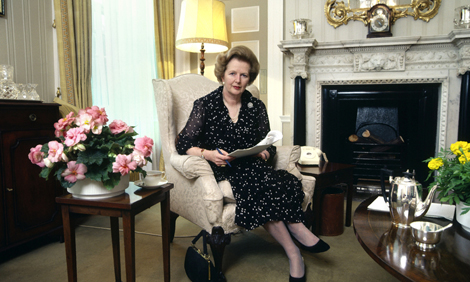


Prime Minister Margaret Thatcher lived and worked at the official prime minister’s residence at 10 Downing Street in London.
Margaret Thatcher, Britain’s first female prime minister, will be remembered as “the Iron Lady.” She was a determined and strong leader who shaped the future of her country and influenced world events.
After her death on April 8, 2013, U.S. President Barack Obama described Thatcher as “a true friend” of America. She helped the United States and the Soviet Union bring an end to 40 years of military tension called the Cold War. Thatcher thought that democratic nations should stand firm against communist countries. However, she encouraged U.S. President Ronald Reagan to meet and work with the Soviet leader, Mikhail Gorbachev. Several years later, the Soviet Union broke apart into separate nations, and many people won their freedom from Soviet control.
Margaret Thatcher was the longest-serving prime minister in modern British history. She led the country for 11 years from 1979 to 1990. When she was first elected, Britain was suffering from a very weak economy and its people were discouraged. Looking back at Thatcher’s time in office, many British people believe that she changed their country for the better. Others think that she changed it for the worse and took away jobs from workers in big industries, such as coal mining.
Thatcher was born in the small town of Grantham, 100 miles north of London, Britain’s capital city. Her father owned a grocery store, and the family lived above it. Thatcher learned her earliest lessons in politics from her father, who was also a local politician. After studying chemistry at Oxford University, she entered politics. In 1975, she rose to the top of the Conservative Party in Britain and was elected prime minister four years later.
Thatcher was a new kind of Conservative in Britain. She believed in taking bold action to turn the country away from government control of business to free markets. Public bus services, except in London and Northern Ireland, went into the hands of private companies. Thatcher fought against the trade unions in government industries, such as the powerful National Union of Mine Workers. By the time she left office, unions had lost much of their influence on British politics.
A rise in Thatcher’s popularity came in 1982 when Britain went to war with Argentina over the Falkland Islands. Britain won the war in ten weeks, and the islands remained in British control.
The Iron Lady was the first woman to lead a democratic western nation. Her career as a woman politician was pioneering. Since then, women have been elected the heads of other western countries, such as Germany, Chile, Argentina, Norway, Canada, and Poland.
Image credit: ©Tim Graham/Getty Images
Related Links
- Margaret Thatcher Biography
Learn more about Margaret Thatcher from a short film and biography. - Margaret Thatcher: Her Journey From Aspiring Politician to World Leader
View a slideshow that highlights Margaret Thatcher’s career in politics.


























